- Home
- Peter Carey
Jack Maggs
Jack Maggs Read online
Table of Contents
Title Page
Praise
Chapter 1
Chapter 2
Chapter 3
Chapter 4
Chapter 5
Chapter 6
Chapter 7
Chapter 8
Chapter 9
Chapter 10
Chapter 11
Chapter 12
Chapter 13
Chapter 14
Chapter 15
Chapter 16
Chapter 17
Chapter 18
Chapter 19
Chapter 20
Chapter 21
Chapter 22
Chapter 23
Chapter 24
Chapter 25
Chapter 26
Chapter 27
Chapter 28
Chapter 29
Chapter 30
Chapter 31
Chapter 32
Chapter 33
Chapter 34
Chapter 35
Chapter 36
Chapter 37
Chapter 38
Chapter 39
Chapter 40
Chapter 41
Chapter 42
Chapter 43
Chapter 44
Chapter 45
Chapter 46
Chapter 47
Chapter 48
Chapter 49
Chapter 50
Chapter 51
Chapter 52
Chapter 53
Chapter 54
Chapter 55
Chapter 56
Chapter 57
Chapter 58
Chapter 59
Chapter 60
Chapter 61
Chapter 62
Chapter 63
Chapter 64
Chapter 65
Chapter 66
Chapter 67
Chapter 68
Chapter 69
Chapter 70
Chapter 71
Chapter 72
Chapter 73
Chapter 74
Chapter 75
Chapter 76
Chapter 77
Chapter 78
Chapter 79
Chapter 80
Chapter 81
Chapter 82
Chapter 83
Chapter 84
Chapter 85
Chapter 86
Chapter 87
Chapter 88
Chapter 89
Chapter 90
Chapter 91
About the Author
Copyright Page
Acclaim for PETER CAREY’s JACK MAGGS
“Wildly entertaining . . . clever, amusing, absorbing, a Christmas pudding stuffed not with nuts and raisins and candied peel [but] with dark, succulent, dense, pungent, knobbly, inscrutable characters every one of whom might have come from a Dickens novel.” —The New York Review of Books
“An original and freestanding performance, replete with the sorts of twists and shocks and coincidences that originally gave page turners a good name.” —Time
“The Australian-born Carey is best known for Oscar and Lucinda, an ethereal novel recently made into a movie starring Ralph Fiennes. But from now on he should be known for the meatier Jack Maggs.” —Daily News
“As always, Mr. Carey writes with energy and fantastic inventiveness.” —The New York Times
“Jack Maggs is an ingenious trick box of a novel, alternately tough and tender. . . . Ambitious, masterfully-paced. . . . It is great galloping fun to enter ‘a world as rich as London itself.’ ” —The Philadelphia Inquirer
“This is Carey’s sixth novel and his most accessible. He obviously wrote it with entertainment in mind, and he hits the mark on every page.” —People
“Throughout this tale of mesmerism, romance, and deceit, he posits weighty questions pertaining to guilt, innocence, self-creation and ownership of thought and memory. As provocative as these questions are, they provide only the background music for Carey’s center stage performance.” —San Francisco Chronicle
“Mr. Carey creates a startling pastiche of Dickensian London, a city gurgling with violence and corruption, suffused with the stench of sulfur and soot.” —The Wall Street Journal
“There’s all kinds of fun to be had in Australian Peter Carey’s newest novel. Some of it lies right on the surface—in Carey’s economical yet robust conjuration of the sights, sounds, smells and feel of Victorian London from its streets to its snuggeries, through the interrelationships of conventions and crimes.” —The Nation
“[Jack Maggs] is a tour de force with the force intact, a Victorian novel set in the 1830s that reads as if it takes place in the 1990s. . . . A superb novel, pure pleasure.” —Men’s Journal
“[Jack Maggs has] a storytelling momentum that Dickens himself would envy. If the book were published in serial form, we’d be biting our nails between each installment.” —Washington Post Book World
“When the author is having a good time, the joy with which the words were written reverberates as they are read. Such is the case with Peter Carey[’s] Jack Maggs: One assumes it was as much fun to write as it is to read.” —The News & Observer
“Everything that can happen does in Jack Maggs and the story is certain to keep you spellbound. . . . You shouldn’t plan on leaving your chair until you’re finished.” —The Baltimore Sun
“Jack Maggs, in capable hands, has all the makings of a spellbinding cinematic adventure—murder, deception, erotic intrigue and a race against time. Jack Maggs is a remarkable novel.” —Detroit Free Press
“Jack Maggs is full of cruelty, goodness, merriment and terror, mysterious inheritances, plot-driving coincidences and sharp-eyed generalizations about segments of the endlessly proliferating human species. Carey just ‘wants to make your flesh creep,’ and he’s done a rattling good job.” —GQ
Think of yourself as a magnet, with your arms and especially your hands as the two poles. Touch the patient by placing one hand on his back and the other, in opposition, on his stomach. Then imagine magnetic fluid circulating from one hand to the other . . .
Question: Should one vary this position?
Answer: Yes, you can place one hand on the head without moving the other, always continuing to maintain the same attention and having the same will to do good . . .
Question: What is an indication that a patient is susceptible to somnambulism?
Answer: When, during magnetisation of a patient, one notices that he experiences a numbness or light spasms accompanied by nervous shaking. Then if the eyes close, you should lightly rub them and the two eyebrows with your thumbs to prevent blinking . . .
Question: Are there different degrees of somnambulism?
Answer: Yes. Sometimes you can only produce drowsiness in a patient. Sometimes the effect of magnetism is to cause the eyes to close so the patient cannot open them; if he is aware of everything around him he is not completely in the magnetic state . . .
Question: How does one bring a patient out of a magnetic state?
Answer: . . . it is by an act of your will that you awaken him.
Question: You mean you only need to will him to open his eyes in order to awaken him?
Answer: This is the principal operation. After that, in order to connect your idea to its object, you might lightly rub his eyes, while willing that he open them; and the effect never fails to occur.
Du magnetisme animal (1820)
by Armand Marie Jacques de Chastenet,
Marquis de Puységur
1
IT WAS A SATURDAY NIGHT when the man with the red waistcoat arrived in London. It was, to be precise, six of the clock on the fifteenth of April in the year of 1837 that those hooded eyes looked out the window of the Dover coach and beheld, in the bri
ght aura of gas light, a golden bull and an overgrown mouth opening to devour him—the sign of his inn, the Golden Ox.
The Rocket (as his coach was aptly named) rattled in through the archway to the inn’s yard and the passengers, who had hitherto found the stranger so taciturn, now noted the silver-capped cane—which had begun to tap the floor at Westminster Bridge—commence a veritable tattoo.
He was a tall man in his forties, so big in the chest and broad in the shoulder that his fellows on the bench seat had felt the strain of his presence, but what his occupation was, or what he planned to do in London, they had not the least idea. One privately imagined him a book-maker, another a gentleman farmer and a third, seeing the excellent quality of his waistcoat, imagined him an upper servant wearing his master’s cast-off clothing.
His face did not deny the possibility of any of these occupations; indeed he would have been a singular example of any one of them. His brows pushed down hard upon the eyes, and his cheeks shone as if life had scrubbed at him and rubbed until the very bones beneath his flesh had been burnished in the process. His nose was large, hawkish, and high-bridged. His eyes were dark, inquiring, and yet there was a bruised, even belligerent quality which had kept his fellow passengers at their distance all through that long journey up from Dover.
No sooner had they heard the coachman’s Whoa-up than he had the door open and was out into the night without having said a single word.
The first of the passengers to alight after him saw the stranger take the porter, a famously insolent individual, firmly by the shoulder blade. He held him there for a good moment, and it was obvious from the look which appeared on that sandy-haired individual’s face, that he held him very hard indeed.
“Now pay attention to me, Sir Reverence.”
The porter was roughly escorted to the side of the coach.
“You comprennay-voo?” The stranger pointed with his cane to a large trunk on the roof. “The blue item. If it would not inconvenience your Lordship.”
The porter made it clear that it would not inconvenience him in the least. Then some money changed hands and the man with the red waistcoat set off into the night, his cane tapping on the cobblestones, and straight up into the Haymarket, his chin up and the orbs of his eyes everywhere reflecting an unearthly flare and glare.
This light had shone all the way from the Elephant and Castle: gas light, blazing and streaming like great torches; sausages illuminated, fish and ice gleaming, chemist shops aglow like caves with their variegated vases illuminated from within. The city had become a fairground, and as the coach crossed the river at Westminster the stranger saw that even the bridges of the Thames were illuminated.
The entire Haymarket was like a grand ball. Not just the gas, the music, the dense, tight crowds. A man from the last century would not have recognized it; a man from even fifteen years before would have been confused. Dram shops had become gin palaces with their high great plate-glass windows, their engraved messages: “Gin at Threepence—Generous Wines—Hot Spiced.” This one here—it was like a temple, damned if it was not, the door surrounded by stained panes of rich dye: rosettes, bunches of grapes. The big man pushed his way up to the bar and got himself a dram of brandy which he drank in a gulp. When he turned, his face revealed a momentary confusion.
Two children were now tugging around his sleeves but he seemed so little aware of their presence that he walked out into the street without once looking down at them.
All around him was uproar, din, the deafening rush, the smell of horse shit, soot, that old yellow smell of London Town.
“Come on, Guv, come with me.”
“Come on, Sir.”
A young woman with a feathered hat had placed her hand on his elbow: such a handsome face, such short legs. He tugged himself free, walked on a yard or so, and blew his great hawk’s nose like a mighty trumpet. As he carefully refolded his handkerchief—a bright green Kingsman of an earlier time—he inadvertently revealed the stumps of the two middle fingers on his left hand, a sight which had already excited curiosity aboard the Rocket.
His Kingsman safely put away for the moment, he started along the Strand, then seemed to change his mind, for a moment later he was heading up Agar Street, then cutting up to Maiden Lane.
In Floral Street, he paused before the now illuminated window of McClusky’s Pudding Shop. He blew his nose again, whether from soot or sentiment the face gave no indication, and then, having entered that famously lopsided little shop, emerged with a syrup dumpling sprinkled liberally with confectioner’s sugar. He ate the dumpling in the street, still walking. What he began in Floral Street he finished back on St Martin’s Lane. Here, just a little south of Seven Dials, the stranger stood on a quiet dark corner, alone, free from the blaze of gas.
It was Cecil Street he had come to, a very short street linking Cross Street to St Martin’s Lane. He dusted down his face carefully with his kerchief, and then set off into the darkness, peering to find what street numbers he could see—none.
He had almost arrived at the great river of Cross Street, with its noise and congestion of gigs and post-chaises, hackney cabs and dog-carts, when he came upon a single phaeton stopped in the street. It was a most expensive equipage, that much was clear even in the dark, and indeed, once he had crossed the street, there was sufficient light to make out a gold coronet emblazoned on the shining black door. From inside he could hear the sound of a young woman weeping.
A moment later, he would have been in Cross Street. However, the door of the carriage opened and a matron in a long dress descended from the coach and addressed the person still seated inside. “Good night, Mum,” she said.
Hearing this voice, the stranger stopped abruptly in his tracks.
The phaeton drove off but the stranger stayed very still in the shadow of a doorway whilst the matron opened the gate leading to a high narrow house directly opposite him. A feeble yellow light showed through the fan light above the front door.
Then he spoke: “Excuse me, Missus, but is this Number Four?”
“If you’ve come for tablets, come back tomorrow.”
“Mary Britten,” he said.
He could hear her rattling a big bunch of keys.
“You come back tomorrow,” she said.
The stranger stepped into the middle of the street.
“Get a lamp, Mary.”
“Who’s that?”
“Someone you should recognize, Mary Britten.”
She remained with her back to him, still busy with her bunch of keys. “It’s dark. Come back tomorrow.”
“Someone you should recognize covered with soot.”
Finally, she found the right key. The door swung open, and the feeble yellow light—there was an oil lamp burning in the hallway of the house—revealed a tall, handsome woman in a long dress: blue or green, very fancy-looking, shimmering like silk. She hesitated a moment, an old lady, all of seventy years, but such was her carriage and her bearing that she would pass, in this light anyway, for fifty.
“So this is Cecil Street,” he said. “I thought it would be posher.”
She hesitated, peering into the night, one hand ready on the door handle. “What you doing here?” she whispered. “You’re a dead man if they find you.”
“That’s a nice home-coming.”
“Don’t bring your trouble here,” she said.
“You got respectable.”
“You come to put the bite?”
“I’m doing well myself,” the stranger said. “You going to ask me in?”
She made no move to offer an invitation, but her tone did become more solicitous. “They treat you bad?”
“Bad enough.”
“How’d you know I was here?”
“I saw your puff in the newspaper.”
“And now you’ve come home to play the old dart, you varmint.”
“No, Ma. I’m retired. I come here for the culture.”
She laughed harshly. “The operah?”
“Oh yes,” said the stranger seriously. “The opera, the theatre, I got a lot of time to make up for.”
“Well, I must go to bed, Jack. So you must forgive me not inviting you in to have a chat.”
“Perhaps I’ll look up Tom.”
“Oh Jesus, Jack.”
“What?”
“You bastard,” she cried with real emotion. “You know he’s dead.”
“No! No, I never.”
“God help me, Jack, God save me. I ain’t so green as that. I know who you paid. I know how it were arranged and all.”
“I didn’t pay no one nothing, I swear.”
“What do you want, Jack?” said the old woman, and this time her voice quavered. “What’re you doing here in London?”
“It’s my home,” Jack said, raising his voice and revealing the fiercer character which the porter at the Golden Ox had briefly glimpsed. “That’s what I want. My home.”
“I still got my Bilboa, so don’t think I wouldn’t use it.”
The stranger shook his head, and laughed. “You worried I might have a bone to pick with you, Ma?”
“Aren’t you worried someone’s going to hang you, Jack?” Having made this bitter speech, she stepped inside the house and closed the door behind her.
“I’m coming back, Ma.”
There was no retort from inside the house, merely the heavy clanking of some chains which seemed to amuse the visitor.
“I’ll be back tomorrow morning. We’ll have a proper chat when I come back.”
There is no doubt that Jack Maggs planned to keep his promise, but the morrow held events he could not foresee. Three weeks would pass before he would call at Cecil Street again.
2
GREAT QUEEN STREET had once been home to the pugnacious Lord Herbert of Cherbury. Lord Bristol had lived there. Also Lord Chancellor Finch, and the Conway and Paulett families. But on that damp Sunday morning when Jack Maggs came marching up from Long Acre with his silver-capped cane tucked under his arm, all that remained of the Golden Age were some pilasters and other ornaments still clinging to the façades of a few houses on the west.
There was now a tobacconist in Great Queen Street, a laundry, and a narrow little workroom where glass eyes were made for dolls and injured gentlemen. Actors lived in rooms at Number 30. A retired grocer from Clerkenwell now had the leasehold to Number 29.

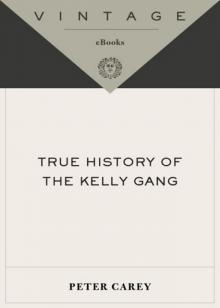 True History of the Kelly Gang
True History of the Kelly Gang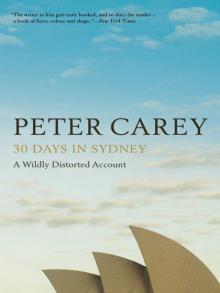 30 Days in Sydney: A Wildly Distorted Account
30 Days in Sydney: A Wildly Distorted Account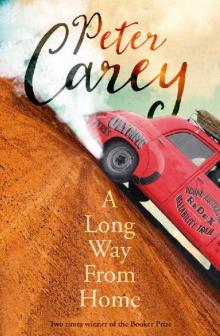 A Long Way From Home
A Long Way From Home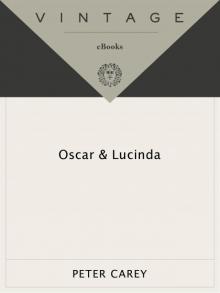 Oscar and Lucinda
Oscar and Lucinda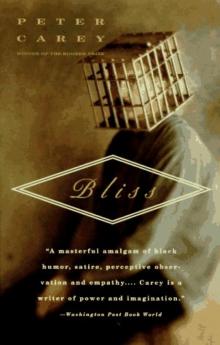 Bliss
Bliss Wrong About Japan
Wrong About Japan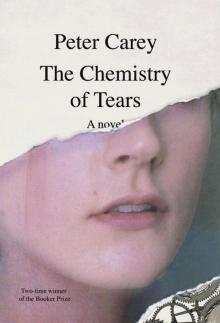 The Chemistry of Tears
The Chemistry of Tears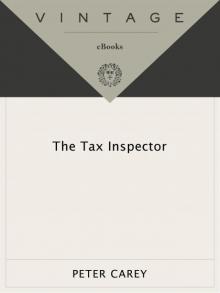 The Tax Inspector
The Tax Inspector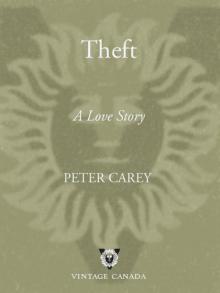 Theft: A Love Story
Theft: A Love Story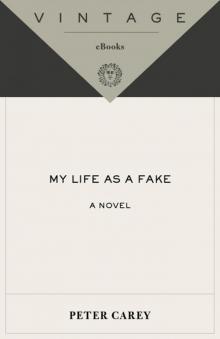 My Life as a Fake
My Life as a Fake Collected Stories
Collected Stories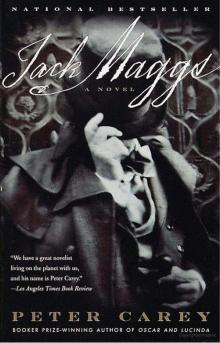 Jack Maggs
Jack Maggs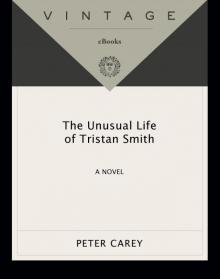 The Unusual Life of Tristan Smith
The Unusual Life of Tristan Smith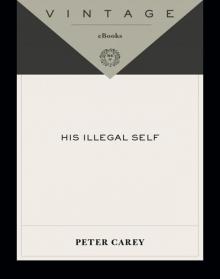 His Illegal Self His Illegal Self His Illegal Self
His Illegal Self His Illegal Self His Illegal Self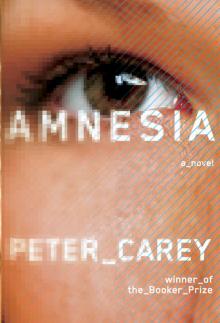 Amnesia: A Novel
Amnesia: A Novel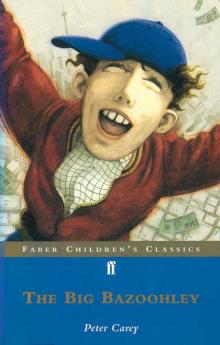 The Big Bazoohley
The Big Bazoohley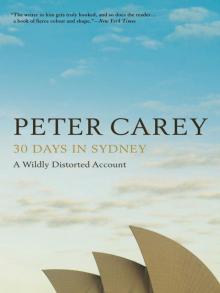 30 Days in Sydney
30 Days in Sydney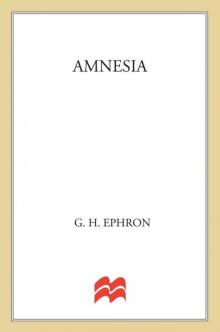 Amnesia
Amnesia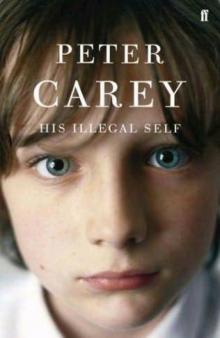 His Illegal Self
His Illegal Self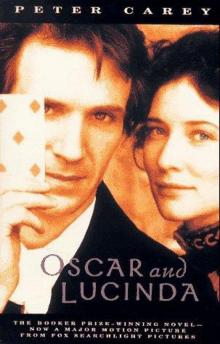 Oscar and Lucinda bw-1988
Oscar and Lucinda bw-1988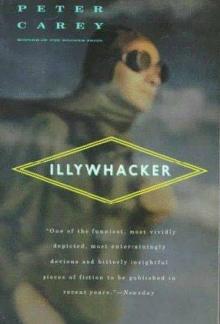 Illywhacker
Illywhacker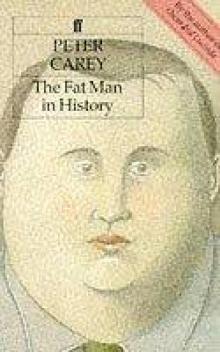 The Fat Man in History aka Exotic Pleasures
The Fat Man in History aka Exotic Pleasures